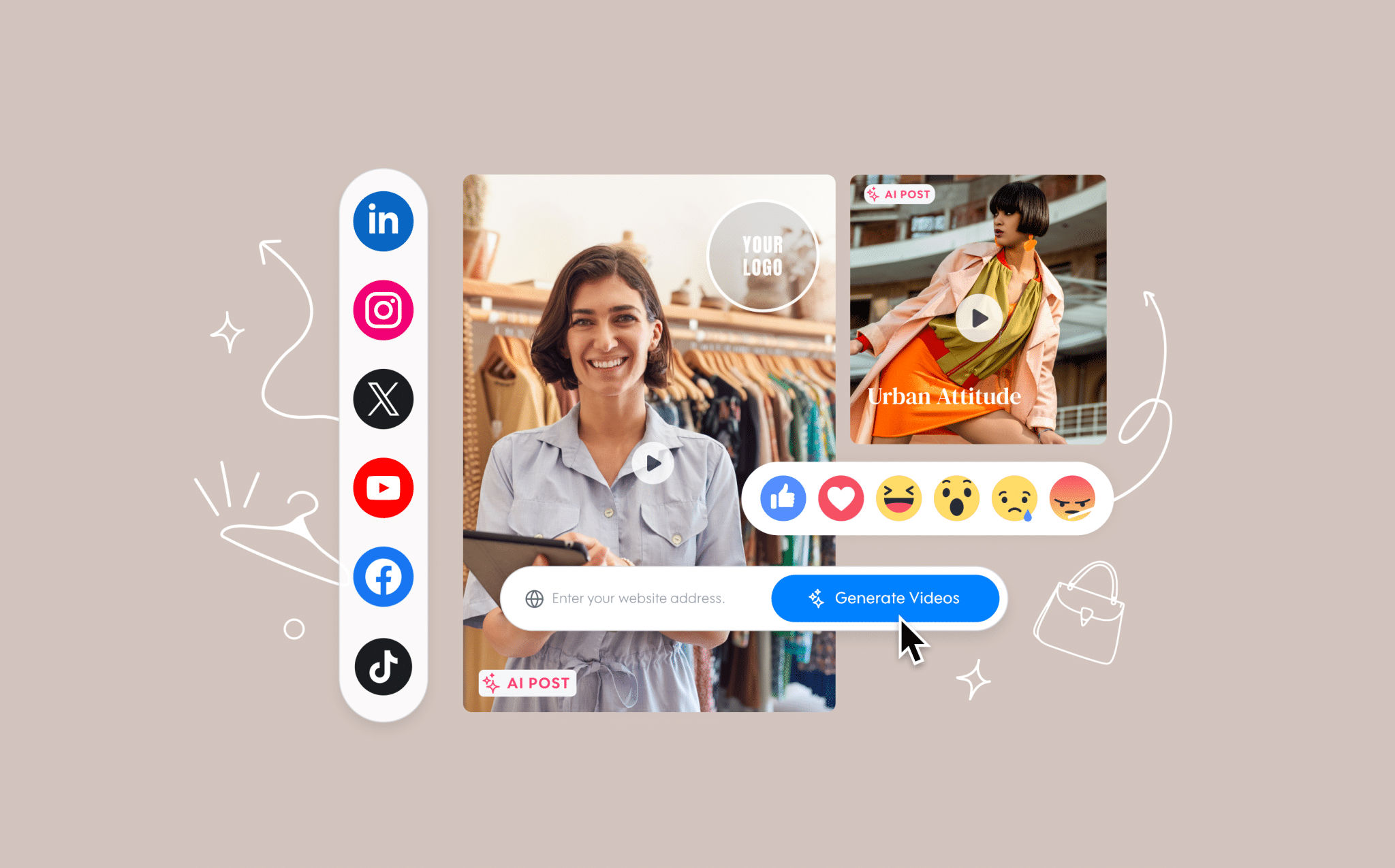
73% of Fashion Execs Prioritize AI in 2024: What It Means for Small Fashion Brands

- Blog
- Small Business Tips
- 73% of Fashion Execs Prioritize AI in 2024: What It Means for Small Fashion Brands
The fashion industry, like every industry, is undergoing a significant transformation, with artificial intelligence playing an increasingly pivotal role. Once reliant on human intuition and creativity, the industry is now shifting toward data-driven approaches that streamline everything from design to customer experiences. In fact, a survey published in February 2024 by McKinsey & Company and the Business of Fashion found that 73% of executives in the fashion industry say generative AI will be a priority for their businesses in 2024, and more than half said they’re already using it.
For small fashion businesses—from boutique clothing stores to personal stylists—AI presents opportunities to optimize operations, predict trends, and get more customers. In this blog, we’ll explore how AI can benefit small fashion and style businesses and help them stay ahead in this evolving landscape.
What Does AI Have To Do With Fashion?
The fashion industry has long been defined by human creativity, intuition, and artistry. Designers relied on their instincts, and trendsetters on their keen sense of style. However, the rise of digital technologies and AI has transformed decision-making in the fashion world, shifting from a purely creative process to one that’s increasingly data-driven. This shift allows fashion brands to analyze vast amounts of information and make more informed decisions, enhancing creativity and efficiency.
Initially, AI entered the fashion industry to automate basic tasks like inventory management and sales forecasting, saving time and improving operational efficiency. But AI’s role has expanded dramatically. Today, AI systems are integral to predicting fashion trends by analyzing data from social media, e-commerce platforms, and major fashion events. Major fashion houses like Louis Vuitton and Dior now use AI tools to forecast market demands, ensuring their collections align with upcoming trends.
AI also plays a vital role in the design process itself. Designers can use AI tools to generate new clothing designs based on specific parameters, such as color schemes, fabrics, or historical fashion trends. This helps accelerate the prototyping phase and encourages more creative exploration by offering unique design variations that a human designer might not have envisioned.
On the manufacturing side, AI improves efficiency by predicting demand, optimizing production schedules, and reducing waste. Robotics powered by AI are used for precision tasks, like cutting and sewing fabrics, which enhances both speed and accuracy in production processes.
When it comes to the consumer experience, AI takes personalization to the next level. AI-powered recommendation engines suggest products based on customers’ past purchases and preferences, while virtual try-on technology allows shoppers to see how garments will look on them before they buy. These features not only improve customer satisfaction but also increase conversion rates for fashion businesses.
Sustainability is another area where AI is making an impact. With rising consumer demand for eco-friendly fashion, AI helps brands optimize their supply chains and identify environmentally sustainable materials. This contributes to reducing the industry’s carbon footprint and helps brands become more sustainable in their operations.
And looking ahead, AI is poised to revolutionize fashion even further. From generative design—where AI co-creates clothing designs—to smart fabrics that can regulate temperature or monitor health, the future of AI in fashion is filled with exciting possibilities.
Applications of AI for Small Fashion Businesses
As we’ve seen above, AI has opened up a world of possibilities for small fashion and style businesses, helping them streamline operations, enhance customer experiences, and stay ahead of the competition. Here are some key applications of AI that can benefit small fashion businesses including boutique clothing stores, fashion designers, and more.
Social Media and Content Creation
In a highly visual industry like fashion, engaging and creative social media content is crucial for connecting with audiences. AI makes it easier for small businesses to produce high-quality content at scale.
AI tools can generate creative, on-brand posts and videos, suggest hashtags, and even schedule content across platforms. This saves time while keeping your social media feed active and engaging, ultimately helping to build a stronger online presence.
Recommended Tools: PromoAI helps small fashion brands create, schedule, and post AI-generated content, including promotional videos and social media posts that reflect their unique brand identity.
Personalized Shopping Experiences
Personalization is key to customer loyalty, engagement, and sales. In fact, 51% of American consumers are more likely to make a purchase when the content is personalized, while 76% express frustration when their expectations for personalization are not met.
AI can analyze customer preferences, browsing behavior, and purchase history to recommend products that match individual tastes. Personalized shopping experiences lead to higher conversion rates and increased customer satisfaction.
Recommended Tools: Nosto and Dynamic Yield use AI to provide personalized product recommendations that elevate the online shopping experience.
Inventory Management and Demand Forecasting
Efficient inventory management and accurate demand forecasting are essential for small fashion businesses to avoid stockouts or overstocking, which can impact revenue: retailers in the U.S. and Canada lost an estimated $350 billion in 2023 due to stockouts.
AI-powered tools predict demand based on trends, historical sales, and external factors, enabling businesses to optimize their stock levels and supply chains. This helps reduce waste, lower costs, and improve profitability.
Recommended Tools: TradeGecko and Netstock offer AI-driven demand forecasting and inventory management solutions, helping fashion businesses maintain optimal stock levels.
Trend Prediction and Design Innovation
With the trend cycle moving faster than ever, staying on top of trends is key to maintaining relevance. AI helps brands anticipate market shifts and innovate with new designs.
AI systems analyze social media, runway shows, and e-commerce data to predict emerging trends. Designers can use AI tools to generate new ideas and accelerate the prototyping process, ensuring they stay ahead of the curve.
Recommended Tools: Heuritech is a powerful tool for trend prediction and design innovation in the fashion industry.
Customer Service Automation
Providing excellent customer service is essential for retaining clients, but it can be time-consuming for small fashion businesses with limited staff.
AI chatbots and virtual assistants offer 24/7 customer support, handling routine inquiries like order status and product details. This reduces the burden on human staff and enhances customer satisfaction.
Recommended Tools: Zendesk and Tidio provide AI-driven customer service automation, offering efficient solutions for small businesses to manage customer interactions.
Visual Search for Product Discovery
Fashion is a highly visual industry, to put it lightly. You don’t have to look much further than Pinterest and TikTok to know that customers often want to find products based on images they’ve seen online or in person.
AI-powered visual search allows customers to upload images and find similar products, improving the product discovery process. This feature enhances the shopping experience and can lead to higher sales conversions.
Recommended Tools: ViSenze and Syte offer AI-powered visual search capabilities that help customers find products more easily.
AI-Driven Pricing Strategies
Dynamic pricing helps fashion businesses remain competitive, especially in a market where prices fluctuate frequently, often related to ever-changing trends.
AI analyzes market conditions, competitor pricing, and customer demand to recommend real-time pricing adjustments. This ensures businesses offer competitive prices while maximizing profitability.
Recommended Tools: Prisync and Dynamic Pricing AI provide AI-driven pricing strategies to help fashion brands optimize their pricing in real time.
Virtual Personal Stylist Assistants
Offering personalized styling advice can elevate the customer experience and increase customer loyalty, but it’s gets more and more challenging to provide this as your business grows.
AI-powered virtual stylists can recommend outfits and accessories based on individual preferences, body type, and occasion. This personal touch helps customers feel valued and catered to, enhancing brand loyalty.
Recommended Tools: True Fit offers virtual styling solutions that create personalized shopping experiences for fashion customers.
AI in Product Photography and Editing
High-quality visuals are essential for selling fashion online, but professional photography can be expensive and time-consuming for small businesses.
AI can enhance product photography by automating editing tasks, optimizing lighting, and even generating 3D images. This ensures products look professional without the need for extensive photo shoots.
Recommended Tools: Canva and DeepAI offer AI-powered photo editing tools that streamline the product photography process, saving time and costs for fashion businesses.
Best Practices for Implementing AI in Fashion and Style
As AI continues to revolutionize the fashion industry, it’s essential for small fashion businesses to implement it thoughtfully. By following best practices, you can harness the power of AI while maintaining the creativity, ethics, and customer-centric approach that defines the fashion world.
Tailor AI to Enhance Creative Processes
Fashion thrives on creativity, and while AI can streamline processes, it should always complement the creative vision. Using AI tools to support design exploration or predict trends can inspire new ideas, but it’s crucial to keep the human element at the forefront. Let AI handle data analysis and administrative tasks, leaving the innovation and artistic direction to the right side of your brain.
Seamlessly Integrate AI with In-Store Experiences
Blending AI with in-store experiences can elevate the customer journey and offer a seamless shopping experience. From AI-powered mirrors that suggest outfit combinations to mobile apps that let customers virtually try on clothing, integrating AI into the physical retail space bridges the gap between online and in-store shopping. This approach creates a more personalized, immersive experience that resonates with modern shoppers.
Ensure Ethical Use of AI in Fashion
As AI becomes more prevalent in fashion, ethical considerations are paramount. Fashion brands are increasingly under scrutiny to ensure they use AI responsibly, especially when it comes to customer data. Prioritize transparency, make sure customers are aware of how their data is being used, and comply with data privacy regulations like GDPR. Additionally, focus on using AI in a way that complements human roles without fully replacing them, helping to sustain jobs in the industry.
Embracing AI for Success in Fashion
Like it or not, AI in the fashion industry is here to stay. Whether you consider yourself tech-phobic or are always at the forefront of new technology, small businesses that embrace AI will see significant benefits, from streamlining operations to improving customer experiences to staying ahead of trends. Whether it’s personalized shopping experiences, trend prediction, or automated customer service, AI provides tools that help small fashion brands remain competitive in an ever-evolving market. However, it’s important to implement AI thoughtfully, ensuring it enhances creativity, complements in-store experiences, and is used ethically.
By embracing AI, you can unlock new opportunities for growth and innovation, staying relevant in a fast-paced industry.
Ready to elevate your fashion brand’s marketing efforts? Try PromoAI today to create on-brand, AI-driven content that resonates with your audience and drives results.
Meet PromoAI
Generate a month worth of video content for your business in just one click!
About the author
Daisy Rogozinsky
Daisy Rogozinsky loves to use the written word to educate, entertain, and tell stories. If she's not writing content, she's writing poetry, music, and screenplays.


